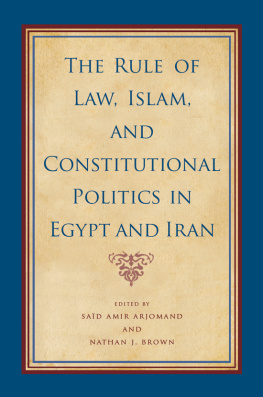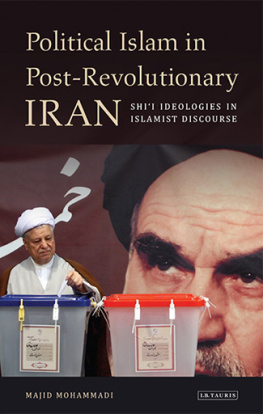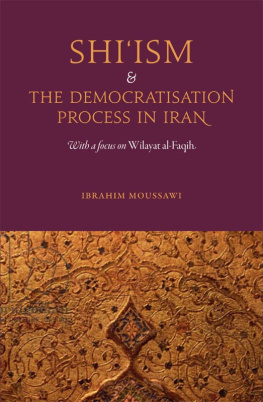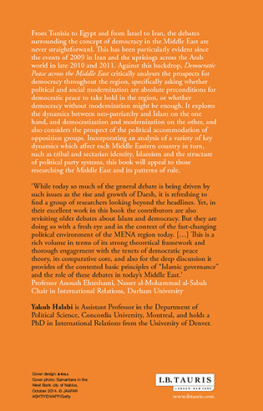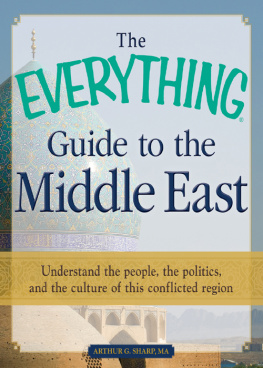SUNY series, Pangaea II: Global/Local Studies
Sad Amir Arjomand and Wolf Schfer, editors
The Rule of Law, Islam, and Constitutional Politics in Egypt and Iran
Edited by
Sad Amir Arjomand
and
Nathan J. Brown
Published by State University of New York Press, Albany
2013 State University of New York
All rights reserved
Printed in the United States of America
No part of this book may be used or reproduced in any manner whatsoever without written permission. No part of this book may be stored in a retrieval system or transmitted in any form or by any means including electronic, electrostatic, magnetic tape, mechanical, photocopying, recording, or otherwise without the prior permission in writing of the publisher.
For information, contact State University of New York Press, Albany, NY
www.sunypress.edu
Production by Eileen Nizer
Marketing by Michael Campochiaro
Library of Congress Cataloging-in-Publication Data
The rule of law, Islam, and constitutional politics in Egypt and Iran / Sad Amir Arjomand and Nathan J. Brown, editors.
p. cm. (SUNY series. Pangaea II : global/local studies)
Includes bibliographical references and index.
ISBN 978-1-4384-4597-7 (hardcover : alk. paper)
1. Rule of lawIran. 2. Rule of lawEgypt. 3. Judicial processIran. 4. Judicial processEgypt. 5. Constitutional lawIran. 6. Constitutional lawEgypt. 7. Islam and stateIran. 8. Islam and stateEgypt. 9. Human rightsEgypt. I. Arjomand, Said Amir. II. Brown, Nathan J.
KMC514.R87 2013
340'.11dc23
2012017399
10 9 8 7 6 5 4 3 2 1
Foreword
Pangaea II: Global/Local Studies
This book series of the Stony Brook Institute for Global Studies engages the global challenges confronting humankind with research, analysis, and education. It aims at empowering individuals and communities to enjoy the benefits and avoid the dangers of globalization. Without political partisanship, the Stony Brook Institute for Global Studies will form worldwide partnerships with those who appreciate the vital contribution of academic excellence to achieving these aims. In so doing, it should also contribute to the extension of human rights, security, freedom, and democracy in accord with the diversity of values and cultures throughout the world.
A civilizational project of the global age, Pangaea II is emerging on the scattered geobody that our world maps depict. Pushed forward by globalization and technoscience, Pangaea II is eclipsing the configurations of nature. For the ubiquitous images, sounds, and texts of Pangaea II, earth's current fragmentation into regions, cultures, continents, and islands has vanished. Rapidly branching communication and transportation networks are interweaving widely distributed societies. TV, telephony, and email have escaped from the gravity of the geobody. Pangaea II is pulling the planet together and colonizing near-earth space. Vanquishing the geographic difference between halfway down the corridor and halfway around the globe, Pangaea II is a dense global conglomeration with physical and metaphysical features such as the routers of the Internet and the fallacious belief that global communication should be easy because it has become instant.
Pangaea II: Global/Local Studies is committed to interdisciplinary social science and the integration of fact and theory in a global context. As the hegemony of the Western center of the world system wanes, and with it that of metropolitan social theory, pluralistic approaches to research grow and multiple centers of learning around the globe emerge. We believe in opening the social sciences, removing old disciplinary boundaries, and exploring the intricate dialectic of the global and the local in the production of knowledge. This series embraces the epistemic challenge of the global age; it privileges comparative and interdisciplinary approaches to illuminate the simultaneous local generalization of the global and the global constitution of the local. Understanding this dialectic at the core of globalization and globality is the goal of Pangaea II. Accordingly, the global/local studies published under Pangaea II combine comparative, universal theorizing with various approaches to local knowledge on national and regional topics.
Sad Amir Arjomand Wolf Schfer
Preface
The idea of comparing the rule of law and constitutional politics in Egypt and Iran began with two consecutive conferences entitled Constitutionalism and the Rule of Law in Egypt and Iran, held in November 2008. The first was organized by Sad Amir Arjomand and sponsored by the Stony Brook Institute for Global Studies at Stony Brook-Manhattan, and the second was organized by Mirjam Knkler, sponsored by the Association for the Study of Persianate Societies (ASPS) as a thematic conversation at the annual convention of the Middle East Studies Association in Washington, D.C. It culminated in a workshop held in May 2009 at the International Institute for the Sociology of Law (IISL) in Oati, Spain. We are most grateful to IISL for its generous hospitality and efficient organization, and to ASPS for covering the travel costs of participants without support from their own institutions.
Two major events have intervened between these conferences and the publication of this volume. The first was the massive protest movement in Iran against electoral fraud in the June 2009 presidential elections that began within a month of our last conference and continued through the summer and fall of that year but ultimately failed to change the structure of Iran's theocratic republic. The second is the (as of this writing) indeterminate revolutionary journey Egyptians began on January 25, 2011one that is motivated by desires to put an end to more than half a century of the authoritarian rule in Egypt. Nathan Brown, who has closely followed this historical watershed, has added an inevitably tentative but nevertheless (we hope!) timely chapter on Egypt's incipient constitutional revolution. On the other hand, a few of the papers presented at our conferences could not be included in the present volume, for understandable reasons. In one case, however, the inclusion of a stimulating and explicitly comparative paper on the relations between central and local government in the two countries was made impossible for political reasons. Its author, Dr. Kian Tajbakhsh, who participated in the workshop in Oati, was arrested shortly after returning to Iran in the aftermaths of the fraudulent presidential elections of June 12, 2009, and was later forced to make sham confessions in the show trial of the jailed Iranian reformists that followed. His imprisonment broke all communication between him and us as editors of the present volume, and we have been urged by its contributors to express their outrage and to protest to the government of the Islamic Republic of Iran his unjust imprisonment, which is in clear and flagrant violation of internationally recognized human rights.
We have used the simplified IJMES transliteration system without diacriticals for Arabic and that of the Journal of Persianate Studies for Persian. The long a for the aleph is, however, not indicated in names, except for authors and in the publication titles cited under references.
Sad Amir Arjomand Nathan J. Brown



